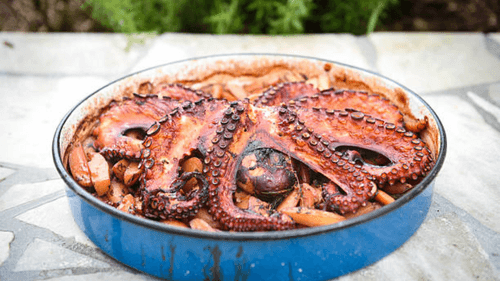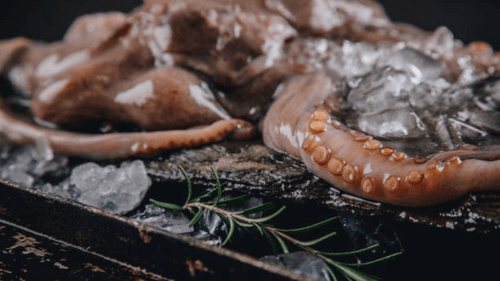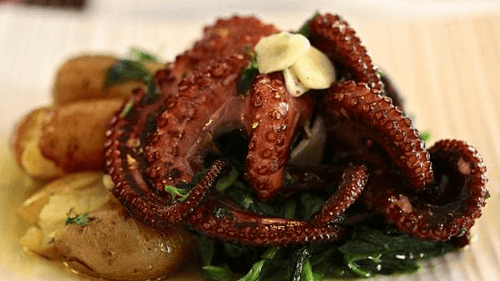Can You Freeze Octopus?
Freezing seafood can be hit and miss-for some of you, but when it comes to freezing octopus, it may send chills down your spine. But the truth is octopus is a fantastic source of protein, and it’s abundant in our coastal waters. Octopus tentacles should be succulent. But is it easy to freeze?

Did you know that octopus is a healthy food? It’s full of iron and is perfect for those who suffer from anemia. Octopus is pure protein; if you work out, this could be the food you have been searching for. It is low in calories and contains many minerals and essentials for healthy living.
In this article, we dive deeply into how you can store this creature from the depths to enjoy its delicious meat when you want. We answer many frequently asked questions providing you with factual information.
Let’s dive in.
Does octopus expire?

Yes. Like any other seafood, Octopus has a short shelf life once out of the water. Raw octopus will only last for 72 hours, and after it has been sitting on a countertop for two hours, it should be discarded due to the proliferation of bacteria growth.
It is common to see octopus on restaurant menus and prepared in various creative ways across Asia and the Mediterranean region. Due to its flavor and versatility, octopus pairs well with many other foods.
However, you don’t need to be adventurous to try octopus. It’s a delicious seafood and, if cooked correctly, is succulent and flavorful.
The best octopus in the world to eat is well recognized to reside off the Atlantic beaches of the US, Spain, Portugal, and Morocco.
This results from the octopuses’ nutrient-rich food, unavailable to others inhabiting other regions and deeper waters. The world’s tenderest and tastiest octopus is known as the “day boat octopus,” and it is the very best money can buy.
Once caught, the octopus is handled in a variety of ways by businesses and fisheries for the convenience of restaurants, chefs, and home cooks.
They can deliver it raw, whole, cut, cooked, or sliced. This takes a lot of the stress of dealing with octopus away from the home cook.
The only distinction between cooked and raw octopus is that one of them has already been cooked. The octopus is frozen by the fishing company, cooked, and then frozen once more.
Time savings is the most significant benefit of purchasing cooked octopus. It only has to be thawed before being eaten raw. It can also be fried or grilled, or it can be included in a salad or another dish.
Don’t worry. Whether you purchase the octopus cooked or raw, the quality will be the same.
Does the octopus need to be refrigerated?

If you buy a cooked octopus and want to eat it shortly, it should be placed in the fridge to defrost.
You will benefit from purchasing cooked octopus because it will make preparation simpler and quicker. You don’t have to handle the octopus, cut its tentacles, or remove its beak. No need to tenderize it, either.
Thawing it out and preparing it in whatever you like are the remaining steps. You can grill, sautee, or cook it in addition to eating it as is with olive oil and lemon.
But it must be stirred in the fridge before cooking.
Does octopus need to be covered?
Yes. Octopus can impart an odor of the ocean into other food contained in the fridge, and It’s always advisable to place octopus and other kinds of seafood in airtight containers.
The airtight container will keep the advancing bacteria load in check and contain odors from the octopus.
Can you put a warm octopus in the fridge?

The octopus should be allowed to cool in the boiled water before placing it in the fridge.
You should always avoid placing hot food or warm food in the fridge. It’s bad housekeeping. Placing a warm octopus in the fridge could cause a bigger problem than you might have imagined.
Your fridge temperature will be 40℉ -18℃ or a little lower. Placing a warm octopus in the fridge will elevate its temperature while it radiates heat.
Your fridge may not be as efficient as you might have thought at removing heat. Most fridges take hours to come to 40℉ after being switched on after cleaning.
So, what’s the big deal? The big deal is that food sitting at a temperature of 40-140℉ is in the food danger zone. It’s not just your spreadable butter. It is the contents of the entire fridge.
Above 40℉-18℃ bacterial growth on perishable foods will accelerate exponentially. It should be discarded if the food remains at an elevated temperature above 40℉-18℃ for just two hours.
Seems harsh? According to the USDA, after two hours in the food danger zone, perishable foods contain enough bacteria to cause food poisoning.
Furthermore, the octopus should be covered in the fridge so there will be no condensation!
How long can warm-cooked octopus sit out?
Two hours. It’s not long, and the time flies when sitting around chatting with friends and drinking an aperitif. Still, the truth is octopus will become contaminated with bacteria and, after just two hours, could make you sick if eaten.
Remember the food danger zone? According to the USDA, spreadable kinds of butter are highly perishable. Sitting out for two hours, the octopus should be discarded.
The bacteria growth on the food has multiplied rapidly, making the food unfit for consumption.
Does unopened octopus go bad?
Baby pickled octopus is a delicacy and is sold in jars. Pickled octopus has a long shelf life if the seal is not broken. The octopus can be stored for 12 months in a cool dark space such as a pantry or kitchen cabinet.
Once opened, the pickled octopus should be stored in the fridge, which will last for two weeks. After two weeks, it should be discarded.
How long does octopus last in the fridge?
3 days. If it is raw or cooked, it has a shelf life of three days in the fridge. After three days, it should be discarded.
Please note. Octopus should smell of the ocean. If it smells fishy, it is already bad.
Of course, baby pickled octopus, and canned octopus have a long shelf life and can last for a year until opened and then a couple of weeks stored correctly in the fridge.
Does frozen octopus go bad?
According to the scientists at the USDA, food stored in the freezer at 0℉ and below has an indefinite shelf life, and to a greater extent, they do. But the problem comes when you want to cook frozen products.
With your frozen product thawed, you may notice the texture will have changed, and when it is cooked, it tastes nothing. This results from either freezer burn or just a natural degradation in the product.
When it comes to frozen octopus, it falls short of an indefinite shelf life. It is good for approximately 9 months in the freezer, and for the best product experience, it should be consumed before nine months.
However, there is a silver lining to every cloud. Octopus becomes tender and succulent in the freezer. The ice crystals tenderize the octopus meat.
If you have a store-bought frozen octopus, the octopus will have an expiry date on the packaging. It may be a best-before date or use-by date. Pay attention to these dates. They are critical to the freshness of the octopus.
The date indicates how long the octopus will remain at its optimum freshness before degrading.
How to freeze fresh octopus
- If you have fresh octopus from the seafood market, ask the seller to remove the beak and clean the octopus.
- When you have the octopus in your kitchen, use disposable kitchen gloves and clean the octopus by placing it under running water. Wash off any debris that may be on the octopus, but clean it thoroughly.
- Add salt. Massage the octopus once the salt has been added. Massage the salt into every crevice. This will tenderize the octopus. After that, wash it off with running water.
- Using extra caution to clean the suckers on the tentacles, repeat the salt and massage technique. The octopus should then be adequately rinsed once more under running water. The octopus can now be pounded with a kitchen hammer to make it soft. The octopus will spend less time on the stove if this is done.
- Slice the octopus how you like it. If you are less experienced, start by removing the tentacles with a sharp knife.
- Place the octopus in a freezer bag or bags.
- Remove as much air from the freezer bag as possible and then seal it tight.
- Mark the bag with the contents and the freezing date.
- Place the octopus in the freezer.
How to thaw frozen octopus?
Thaw the octopus in the fridge overnight.
The meat should be soft once it has frozen, which will make cooking the octopus much more straightforward than if it were cooked fresh.
The thawed octopus can be kept in the refrigerator for up to two days. It will begin to become contaminated with hazardous bacteria after this time. You risk getting sick if you consume tainted octopus. Therefore, it is advisable to discard them.
Related:
- Can you freeze cockles?
- Can you freeze snow crab legs?
- Can you freeze clams?
- Can you freeze squid? Freezing method and guide
- Can you freeze Tilapia?
- Can you freeze mussels? Storage guide
- Can you freeze tuna? Best freezing method
- Can you freeze lobster? Best way to store them
- Can you freeze Crawfish? How to store Crawfish properly
- Can you freeze blue crabs?
Final thoughts.
Octopus is a wonderfully versatile protein that is excellent grilled or stir-fried. Buy cooked octopus, it takes the hassle out of cleaning, and it can be cooked the same way.
Fresh or cooked octopus will last for 9 months in the freezer.





